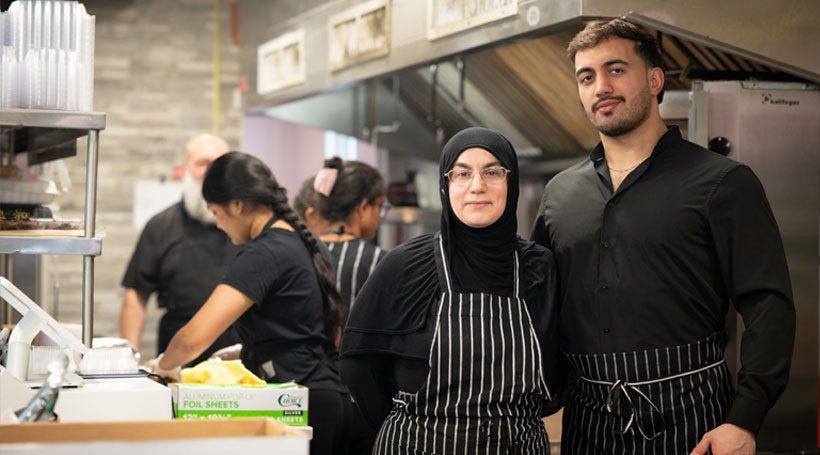Photo above by Dana Romano: Emanet and her son Muhammed
Just before 11 am, the kitchen at the Emanet family’s restaurant was in full swing, prepping a large catering order due at noon in Marlton. The staff had barely opened the doors when ICE agents walked in.
The food wasn’t even packed yet. Muhammed Emanet arrived at the restaurant just as his parents, Emine and Celal, were being arrested. Amid the chaos – agents, handcuffs and stunned staff – his mother Emine turned to him with a single instruction: “Make sure you deliver the order.”
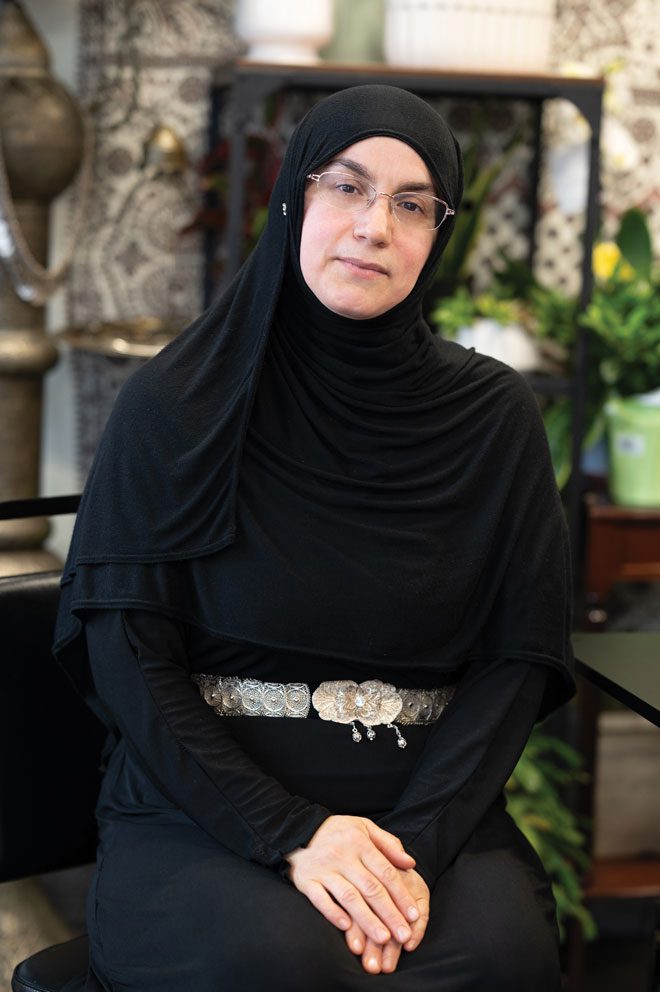
Emine Emanet Photo: Dana Romano
At first glance, Jersey Kebab is just another beloved local eatery in Haddon Township. But walk through its doors, and you’re entering something more intimate – a home. The restaurant has always been more than just a business. For Emine, her husband Celal, and their 4 children, it has been an extension of their values: hospitality, generosity and resilience.
That resilience was put to the test in February, when Emine and Celal were arrested by U.S. Immigration and Customs Enforcement (ICE) and taken to a detention center in Elizabeth, New Jersey. It was a moment that would shake the family – and their entire community.
The couple was placed in handcuffs and taken for processing. Celal was released, but Emine was sent to the detention center.
“I didn’t realize what was happening until I was on the prison bus,” Emine says. “Looking out at the sunset, it hit me – I was going to jail.”
On March 12, after spending two weeks behind bars, Emine returned home on a $7,500 bond.
The conditions were harsh. As a Muslim woman who wears a hijab, being without a headscarf was especially difficult. She improvised, tying two T-shirts together and wearing the same sweater for two weeks to maintain modesty.
Despite everything, Emine’s faith never wavered.
“I knew that God had a plan,” she says. “And I believed that as long as I tried to help others, it would all be ok.”
Inside the detention center, she was surrounded by others facing similar circumstances – people who, like her, were navigating uncertain futures. Those connections, along with her family’s daily visits, gave her strength.
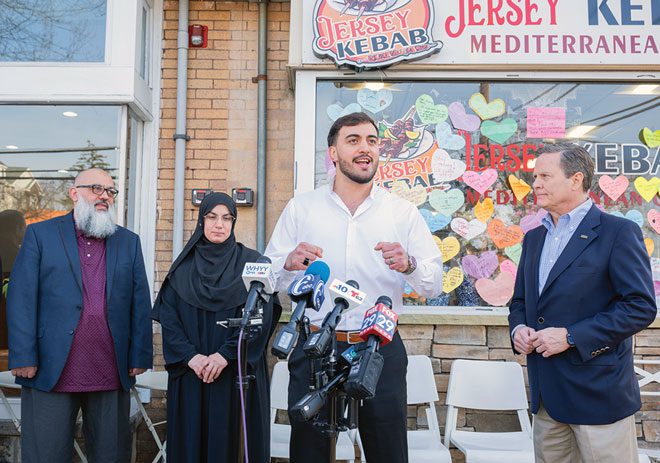
Muhammed Emanet at a press conference to show community support outside the restaurant with his parents and Cong. Donald Norcross
“Mentally, I felt light,” says Emine. “I knew people were praying for me. That gave me peace.”
But for the Emanets, this wasn’t the beginning of their struggle with immigration. It was only the latest chapter in a long story.
The Emanet family’s American journey began with Celal, who first came to the United States in the early 2000s to pursue a master’s degree.
“My husband always described America as this incredible place – a huge city with beautiful sights and kind people everywhere he went,” says Emine. “He encouraged the rest of the family to move here, too. So when we were all finally approved for our visas, it was something we had hoped for, for a long time.”
In 2008, they sold everything they owned in Turkey and arrived in the U.S.
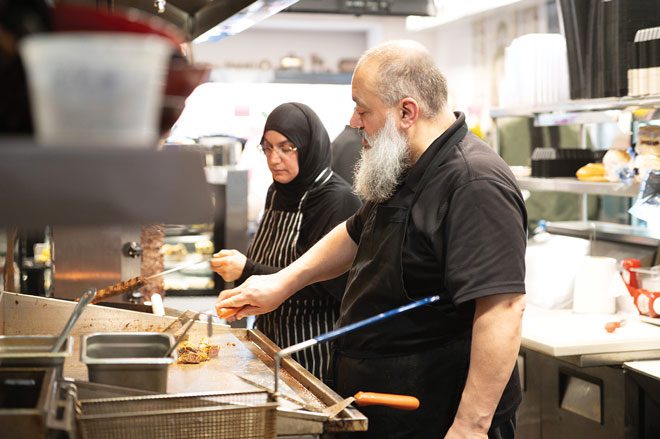
Emine & Celal Emanet cooking at their restaurant Photo: Dana Romano
At the time, Emine spoke no English and was pregnant with their third child. Their eldest, a nine-year-old son and a seven-year-old daughter, also spoke only Turkish. But through public schools and daily life, they began to adapt. In those years before opening the restaurant, Celal worked as an Imam at a mosque during the day and drove a bread truck for a local bakery at night, delivering bread to diners in the area to support his wife and – within a few years – 4 children at home.
The Emanets weren’t just building a life – they were preserving a legacy.
Despite their contributions to their community and their determination to play by the rules, the family’s immigration status was never fully secure. Their visa, tied to Celal’s work, only provided him with a social security number. The rest of the family remained in limbo – here legally but with no social security numbers, no health benefits and no eligibility for financial aid.

Camden County Commissioner Director Louis Cappelli Jr. & Haddon Twp. Mayor Randall Teague at a press conference to show community support outside the restaurant
Celal filed for a green card before his visa expired, but his application was denied – three times. Since 2016, the family has lived under a “pending” status, waiting for appeals to be heard. Though this status allowed them to remain in the country legally, it left them vulnerable under shifting immigration policies.
Muhammed, the eldest son, experienced this firsthand when ICE agents arrested him in 2020. Just 20 at the time, he was taken from his home at 5 am, handcuffed and taken to a Homeland Security facility. Stripped, interrogated and held in isolation, Muhammed was eventually released after agents determined he wasn’t a flight risk. (He was set to start classes at Camden Community College that Monday.)
He was placed in deportation proceedings – proceedings still unresolved five years later. Now married to a U.S. citizen with two young sons, Muhammed has petitioned for permanent residency, but can’t move forward until his original case is resolved.
“We’re not hiding,” he says. “We’re not illegal. We’ve just been stuck in this system for years.”
So when ICE came for his parents, the scene was familiar, he says.
“I’ve seen those officers before,” says Muhammed. “I’ve been in those handcuffs before. But as soon as I saw it happening, I was like, ‘Here it goes, man. We’re really starting now.’”
When news of Emine’s arrest broke, the response from the community was immediate and overwhelming.
“People didn’t just support us – they embraced us,” says Muhammed. “They built a circle of protection around our family.”
That sense of mutual care wasn’t new. The Emanets had always been deeply embedded in their community. They donated to local causes, supported parades, volunteered with Toys for Tots and Girl Scouts, and always stepped up first in times of need.
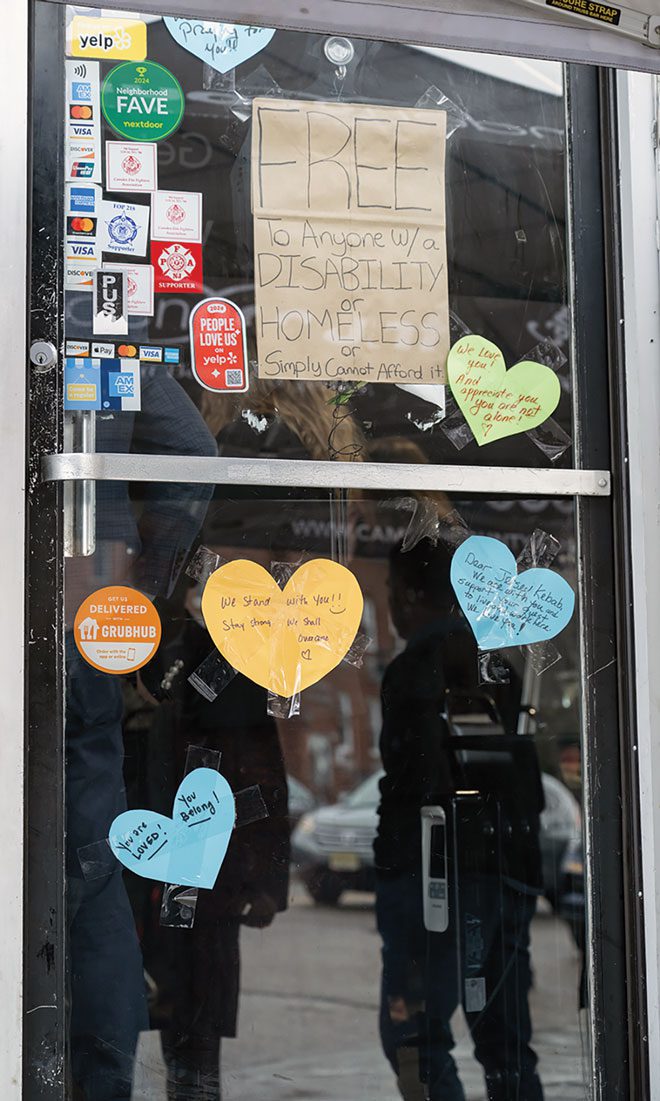
A sign on the restaurant’s front door
At their restaurant, a sign has hung on the door since day one: “Free food for anyone with a disability, homeless or simply cannot afford it.”
To the Emanets, generosity is a way of life – not a business tactic. They never ask for anyone’s story. If someone is hungry, they feed them.
In the wake of Emine’s detention, that same spirit came back to them tenfold. Community members wrote letters of support, packed the restaurant with messages of love and made sure the Emanets knew they weren’t alone.
“I walked into the restaurant after I got out and saw the walls covered in hearts and notes of support,” says Emine. “I was overwhelmed with gratitude.”
“Our immigration status always kept us at arm’s length from fully believing in the American Dream,” she adds. “But we’ve always tried to live by the idea that life is what you make of it – no matter where you are. But I think as long as you strive to be the best person you can be, the American Dream can still be real. It’s not something that’s handed to you – it’s something you build.”
Now, both Emine and Celal are facing the same deportation process Muhammed was placed under in 2020. Except this time, their court dates are set for the coming month.
Under a recent policy shift, “pending” immigration status – previously considered a lawful status – has now been redefined. People like the Emanets, whose applications are in process, are being labeled as “out of status,” effectively rendering them deportable.
Despite everything, the Emanets remain grateful. They don’t speak with bitterness – only with resolve.
“We don’t blame America,” says Emine. “We just want the chance to stay here, in this country, among these kind and beautiful people we’ve come to love. This is home.” Emanet and her son Muhammed


